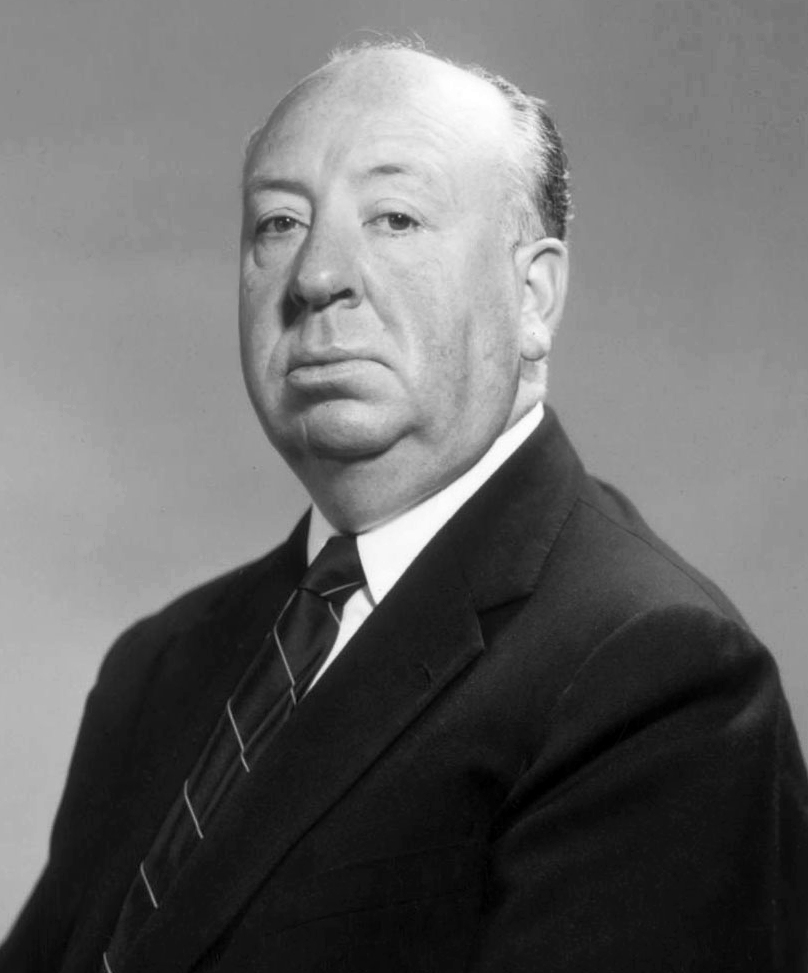“Anche se facessi Cenerentola, il pubblico cercherebbe qualche cadavere nella carrozza.”
citato in Portala al cinema, p. 146
Sir Alfred Joseph Hitchcock è stato un regista e produttore cinematografico britannico naturalizzato statunitense. È considerato una delle personalità più importanti della storia del cinema.
Lo spartiacque nella carriera di Hitchcock è rappresentato dal suo trasferimento da Londra a Hollywood, avvenuto nel 1940. In base a questa data, gli studiosi suddividono la sua produzione in due grandi periodi:
il periodo inglese, che va dal 1925 al 1940, durante il quale ha diretto ventitré film, di cui nove muti;
il periodo americano, che va dal 1940 al 1976, durante il quale ha diretto trenta film, fra i quali si annoverano i più conosciuti.
L'ultimo film è Complotto di famiglia diretto nel 1976.
Il regista è conosciuto anche, grazie ai suoi capolavori thriller, come "maestro del brivido".
Nel 2012 è uscito nelle sale cinematografiche Hitchcock, con protagonisti Anthony Hopkins, Scarlett Johansson e Jessica Biel, film biografico incentrato sul rapporto tra il regista e sua moglie Alma Reville durante la lavorazione del film Psyco.

“Anche se facessi Cenerentola, il pubblico cercherebbe qualche cadavere nella carrozza.”
citato in Portala al cinema, p. 146
citato in Portala al cinema, p. 5
“C'è qualcosa di più importante della logica: l'immaginazione.”
Origine: Citato in Focus, n. 111, p. 116.
citato in Chi c'è in quel film?, p. 367
“Stewart è il perfetto eroe hitchcockiano, perché è l'Uomo Qualunque messo in situazioni bizzarre.”
citato in Chi c'è in quel film?, p. 368
citato in Chi c'è in quel film?, p. 368
News summaries (31 December 1963).
“[This award is] meaningful because it comes from my fellow dealers in celluloid.”
On receiving American Film Institute's 1979 Lifetime Achievement Award, recalled on his death (29 Apr. 1980).
“The silent pictures were the purest form of cinema.”
As quoted in Hitchcock (1967) by François Truffaut
“The lower lip definitely states that all actors are cattle—including the authorǃ”
Handwritten note accompanying Hitchcock's sketched self-portrait; as seen in—and addressed to the author of— "Melodrama Maestro" http://www.mediafire.com/view/uvl045zkpces0io/MELODRAMA_MAESTRO.jpg by Hume Cronyn, in McClean's (1 November 1944).
“I’m not against the police; I'm just afraid of them.”
As quoted in Hitchcock (revised edition 1985) by François Truffaut, p. 109 http://books.google.com/books?id=NnE_sPb3XBQC&q=%22I'm+not+against+the+police+I'm+just+afraid+of+them%22&pg=PA109#v=onepage.
“Hitchcock: You know that I think all actors are cattle?
George Raft: Yes, I know—but I'm no actor.”
On the set of The House Across the Bay; as quoted in "The New Yorker" http://www.mediafire.com/view/t6bdmd0wg1hvd8m/%20.png by Leonard Lyons, in The Washington Post (26 July 1940).
As quoted in "New York Close-Up" http://www.mediafire.com/view/sllj68n3ug6dgju/Concert_Thursday_to_Aid_Memori.jpg.
As quoted in "New York Close-Up" http://www.mediafire.com/view/sllj68n3ug6dgju/Concert_Thursday_to_Aid_Memori.jpg by Tex McCrary and Jinx Falkenburg, in New York Herald Tribune (27 February 1950).
“The Birds could be the most terrifying motion picture I have ever made.”
Movie trailer for the 1960s film The Birds.
Hitchcock's Definition of Happiness https://www.youtube.com/watch?v=14dOICbwSIs (YouTube video), excerpt from CBC's interview 'A Talk with Alfred Hitchcock' (1964). Quoted in "Hitchcock's Secret to Happiness" http://www.theatlantic.com/health/archive/2012/03/hitchcocks-secret-to-happiness/254769/ by Maria Popova, The Atlantic (20 March 2012).
“It still goes. But Pat is the nicest cattle I've ever seen.”
Reaffirming the "actors are cattle" quote while in Boston to see his daughter perform onstage; as quoted in "The Lyons Den" https://news.google.com/newspapers?id=3ZBRAAAAIBAJ&sjid=0mkDAAAAIBAJ&pg=5954%2C4412673 by Leonard Lyons, in The Pittsburgh Post-Gazette (20 October 1944).
Defending his repetition of filming techniques, in The Observer [London], (8 Aug. 1976).
“You can't direct a Laughton picture. The best you can hope for is to referee.”
Films and Filming (Volume 9, Issue 3; 1963), p. 20 https://www.google.com/books/edition/Films_and_Filming/GMARAQAAMAAJ?hl=en&gbpv=1&bsq=%22you+can%27t+direct%22+hitchcock+laughton